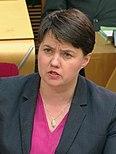2021 Reform Party leadership election
| |||||||||||||
| Turnout | 61.4% ( | ||||||||||||
|---|---|---|---|---|---|---|---|---|---|---|---|---|---|
| |||||||||||||
| |||||||||||||
The 2021 Reform Party leadership election was held between 22 July and 2 August 2021 to elect a new leader of the Reform Party, after previous leader Esther Bennett resigned following the poor performance of the party in the 2021 general election.
A number of party members initially made known that they were interested in standing for the leadership. Former cabinet ministers Andrew Sinclair, Roseline Perrier, Nicola Ramsey and Marjanne Sudermann all put themselves forward for the leadership. On 12 July, party backbencher Jim Reynolds announced his intention to stand for the leadership as a unity candidate. Sinclair, Ramsey and Perrier withdrew and endorsed Reynolds.
Nominations closed on 18 July, with Reynolds and Sudermann as the only candidates. The final ballot saw Reynolds secure 72.8% of votes from the party membership, and he was declared as the new leader of the party on 2 August.
Background
The Reform Party had been led by Esther Bennett since her election as leader in October 2014. Bennett had succeeded former Prime Minister Daniel Hawkins. She sought to lead the party back to power in the 2016 general election, but was instead forced to sign a coalition deal with the Sotirian Democratic Union, her party's historic rivals.
Bennett served as Deputy Prime Minister and Foreign Secretary from 2016 until 2021, with a number of other high-ranking Reform politicians serving in a number of roles in the cabinet, first under Richard Graham and then under Reginald Wilton-Smyth. Her party experienced a poor result in the 2018 election, and in the 2021 election Bennett lost her seat of Tolbury Outer. The party saw a 9.6% swing against them in the party preference vote, and a 6.8% swing against them in the constituency vote. The party lost 57 seats, and the party's tepid reponse to the gambled pensions scandal was partially blamed for this.
Bennett resigned as leader. Deputy leader Andrew Sinclair became acting leader, while party president Charles Crampton became responsible for organising a leadership election.
Procedure
The procedure for a leadership election is outlined in the party's Governing Directives. When Esther Bennett announced her intention to stand down as leader, the Executive Committee - chaired by Party President Charles Crampton - was called to action in order to establish a timetable. The Committee met on 5 June, and officially released the timetable on 7 June.
Elections for Reform Party leadership positions use preferential voting, with voters able to rank candidates in order of their preference. According to the Governing Directives, the electorate for internal elections is comprised of all who held party membership at the time nominations open, establishing an effective cut-off date for membership in this election of 24 June.
The directives also outline the requirements for candidates. They must be a federal MP, and have to recieved nominations from either 5% (2) of the parliamentary Reform Party, 10% (7) of the party's (or sister party's) elected representatives across the constituent entities, or more than 1,000 ordinary party members.
Timetable
Key dates in the leadership election are listed below:
| 28 May | Esther Bennett steps down |
| 7 June | Executive Committee sets timetable |
| 25 June | Nominations open |
| 18 July | Nominations close |
| 22 July | Voting begins |
| 1 August | Voting ends |
| 2 August | Results announced |
Campaign
The first candidate to self-nominate for the position was Roseline Perrier, who announced her intention on 2 July. As former Euclean Secretary, Perrier said that her leadership would focus on "open, liberal leadership" and a "firm committment" to the Euclean Community. On 3 July, Marjanne Sudermann announced her candidacy. Sudermann is an ethnic Aldman, arguably one of the most high-profile Aldmans in Estmerish politics, and former Equalities Secretary. She claimed that protecting the rights of linguistic and ethnic minorities would form a key pillar to her leadership.
Party deputy leader and former Justice Secretary Andrew Sinclair put himself forward on 4 July, as the "moderate, free-thinking" alternative with "experience to spare". He was followed by Nicola Ramsey, the former Labour and Business Secretary, on 7 July, who had previously explored Reform's options with entering coalition with the SDCP, and is considered to be on the party's left.
On 12 July, Jim Reynolds announced his intention to seek the leadership. As the son of party founder Robert Reynolds and as Defence Secretary in the Second Reid ministry, Reynolds had been widely seen as a potential leader for some time. He announced his intention to "unite the party", by "returning to its roots". After he announced his intention to stand, Sinclair, Perrier and Ramsey all withdrew from the race on the same day and announced their support for Reynolds. Sudermann remained in the race.
Both candidates recieved enough nominations from MPs by 13 July. Reynolds had recieved more nominations than Sudermann by the close of nominations on 18 July.
Reynolds was considered the frontrunner among the final two candidates, having more name recognition and being the only candidate to have served in a Reform-led government. Sudermann was considered to be from the party's left, as a social liberal and a progressive, while Reynolds was seen as a party centrist and a unifying figure. Both candidates have criticised the party's coalition with the Sotirian Democratic Union; but Reynolds' criticism was seen as more authentic as, unlike Sudermann, he did not serve in Wilton-Smyth's government.
Candidates
Declared
| Candidate | Most recent position | Constituency | Announced | Campaign logo | |
|---|---|---|---|---|---|
| Jim Reynolds | Secretary of State for Defence (2003-2007) |
Hazelham and Grenfield | 12 July | 
| |
| Marjanne Sudermann | Secretary of State for Equalities (2018-2021) |
Wealdland List | 3 July | 
| |
Withdrawn
| Candidate | Most recent position | Constituency | Announced | Withdrew | Campaign logo |
|---|---|---|---|---|---|
| Andrew Sinclair | Secretary of State for Justice (2016-2021) |
Colton North | 4 July | 12 July (endorsed Reynolds) |

|
| Nicola Ramsey | Secretary of State for Labour, Business and Social Dialogue (2018-2021) |
Driscoll and the Borders | 7 July | 12 July (endorsed Reynolds) |
|
| Roseline Perrier | Secretary of State for the Euclean Community (2017-2021) |
Flurland List | 2 July | 12 July (endorsed Reynolds) |

|
Declined
- Willie Woodroofe, Secretary of State for Commerce and International Trade from 2018 to 2021 (endorsed Reynolds)
- Steve Hooten, Secretary of State for Energy and Natural Gas from 2018 to 2021 (endorsed Reynolds)
Endorsements
Jim Reynolds
- Melissa Smith, Prime Minister from 1990 to 1992
- Willie Woodroofe, Secretary of State for Commerce and International Trade from 2018 to 2021
- Steve Hooten, Secretary of State for Energy and Natural Gas from 2018 to 2021
- Andrew Sinclair, Secretary of State for Justice from 2016 to 2021
- Nicola Ramsey, Secretary of State for Labour, Business and Social Dialogue from 2018 to 2021
- Roseline Perrier, Secretary of State for the Euclean Community from 2017 to 2021
- Abigail Kynd, journalist at The Standard
Marjanne Sudermann
- Matt LePonde, journalist at The Standard
Results
| Candidate | Votes | % | ||
|---|---|---|---|---|

|
68,476 | 72.8 | ||

|
Marjanne Sudermann | 25,585 | 27.2 | |
| Total | 94,061 | Turnout | 61.4 | |






